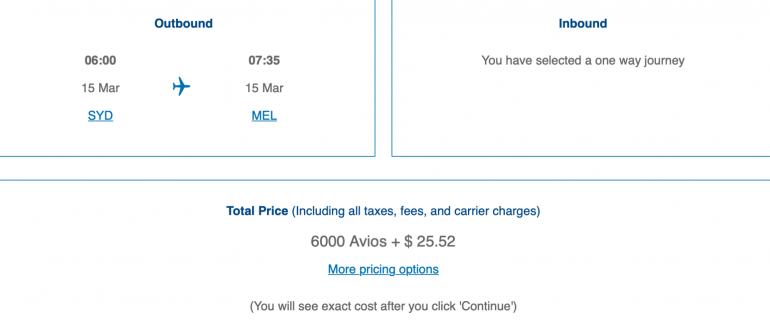5 of the Best Airline Award Sweet Spots

Many or all of the products on this page are from partners who compensate us when you click to or take an action on their website, but this does not influence our evaluations or ratings. Our opinions are our own.
You’ve worked hard to earn your miles and points, and you want to make sure to get the most bang for your buck. With so many different options out there, it can be overwhelming to try to make sure you’re getting a good value.
Without knowing what your desired travel destination is or how many miles you’ve stashed in your accounts, making a precise judgment can be difficult.
But with a little bit of patience, perseverance and know-how, you can get some great deals using the right kinds of miles.
Here are five of our picks for some of the best miles and points sweet spots you might not have known about.
1. Fly to Hawaii with American Airlines or Alaska Airlines, using British Airways Avios
Hawaii is an ideal destination to melt away those winter blues. Since airlines know that you’re freezing in the winter, fares to the tropical paradise can get pricey. But British Airways uses a distance-based award chart, so no matter the origin and destination, you’re charged a flat points rate based on distance.
Flying from the West Coast to Hawaii clocks in at a mere 12,500 miles each way, and you can fly on either Alaska Airlines or American Airlines.
Alaska offers, on average, 29 daily round-trip flights from the West Coast to Hawaii, and American adds a few more out of their Los Angeles gateway.
British Airways Avios are also very easy to come by. The British Airways Visa Signature® Card is one way, but they are also a transfer partner with Chase Ultimate Rewards® and American Express Membership Rewards.
2. Air France/KLM Award Sales
Air France and KLM share the same mileage program, Flying Blue. Every month, Flying Blue runs their noted Promo Rewards sales, where you can save up to 50% on popular destinations.
The deals change, so it’s always a good idea to check back and see what’s new on the list.
Air France and KLM are transfer partners with all the major credit cards including Capital One, Chase Ultimate Rewards®, American Express Membership Rewards and Citi Thank You Points, so coming up with a large number of points isn’t too complicated.
3. Turkish Airlines Miles&Smiles program
Without limiting ourselves to one specific award flight, it’s important to highlight the Turkish Airlines Miles&Smiles program. A transfer partner with Citi Thank You Points, this program can be a great value if you know how to read the Turkish Airlines award charts.
Turkish flies under the radar of most miles and points aficionados but truly offers amazing value. Based on our most recent analysis, NerdWallet values Turkish Airlines miles at 0.7 cent each.
Some great one-way award flight prices include:
North America to Europe for 45,000 miles in business class.
North America to Central Asia for 52,500 miles in business class.
Europe to Oceania/Australia for 55,000 miles in business class.
Domestic flights on United Airlines for 7,500 miles in economy.
4. Intra-Africa flights using United miles
Intra-Africa flights can be quite pricey, but as long as the flight is under 800 miles, you can snag the ticket for only 8,000 miles. The Star Alliance has plenty of African partners including South African Airways, Ethiopian Airways and Egyptair.
United miles are probably easiest to come by for most readers by flying on United Airlines, but also since United partners with Chase Ultimate Rewards®, you can use your flexible Chase points to book as well.
A sample flight from Johannesburg to Lusaka in Tanzania can run over $200, but as an award ticket it’ll only run you 8,000 United Miles.


5. Any short flight using British Airways Avios
This sweet spot has been around for years, and it’s one of the greatest values you can find in the award flights space today. Though British Airways no longer publishes an official award chart, we’ve seen the prices below hold true.
If you’re flying on Alaska Airlines, American, Iberia, Finnair, Cathay Pacific, Qantas, JAL or even Qatar and your flight is under 1,151 miles, you’re in luck. Since British Airways uses a distance-based award chart, anything under 1,151 miles is one low price — and outside of North America, any flight under 651 miles is even less.
For British Airways partner flights between 1 and 650 miles, you’ll pay just 6,000 Avios. If you’re between 651 and 1,150 miles, expect to pay 9,000 Avios.
If you take those flights on British Airways planes, you’ll pay 4,000-4,500 Avios for the shorter flights and 6,500-7,500 Avios for those up to 1,150 miles in length.
This sample flight from Sydney to Melbourne will set you back 6,000 Avios in coach, but if you’d like a little extra splurge, you can spring for business class. For 12,500 Avios, you’ll get free luggage allowance, comfortable seating, airport lounge access, priority boarding and more.
Considering these business class flights can price out at over $600 for a 90-minute flight, 12,500 Avios seems like a fantastic price in exchange, yielding a value of 4.8 cents point. (This is well above any of NerdWallet’s baseline valuations for miles on major U.S. airlines.)


The bottom line
Remember that just because you earn miles with a program doesn’t mean you have to redeem them for travel on that airline. Earning with credit cards that offer flexible currencies such as Chase and American Express afford you the chance to take advantage of some super sweet spot deals on airlines you may not have even known existed.
How to maximize your rewards
You want a travel credit card that prioritizes what’s important to you. Here are some of the best travel credit cards of 2025:
Flexibility, point transfers and a large bonus: Chase Sapphire Preferred® Card
No annual fee: Wells Fargo Autograph® Card
Flat-rate travel rewards: Capital One Venture Rewards Credit Card
Bonus travel rewards and high-end perks: Chase Sapphire Reserve®
Luxury perks: The Platinum Card® from American Express
Business travelers: Ink Business Preferred® Credit Card

